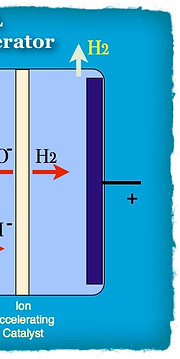
Electricity

Ion Accelerator - Self-Sustaining Hydrogen Production Technology

H2 Innovation Lab
Presenting the acquisition proposal for a revolutionary, game-changing, clean energy technology with the ability to transform modern energy.

H2IL
The Next Generation In Energy
Ion Accelerator
New Way of Generating Energy
-
A science breakthrough achieves highly efficient Hydrogen gas generation giving unique applications.
-
An emerging technology that accelerates natural ionic reactions within an electrochemical cell to release hydrogen gas from unprocessed rain or sea water. Achieving an unmatched efficiency 50x greater than conventional brute-force electrolyzers.
-
World First Self-Sustaining process that extracts more energy (as an existing fuel bound in H2O) than the energy needed to extract the fuel.
-
Scalable, on-site generation, eliminates complex gas storage and transportation infrastructure along with associated issues obstructing the hydrogen economy.
-
The ability to generate electricity, for grid or micro-grid supply, in addition to producing hydrogen gas, provides a solution to the current Hydrogen Economy chicken-and-egg scenario.
-
Producing more clean hydrogen per kWh than conventional, 200 year old, brute-force electrolysis.
(1.2 kWh/kg/H2 compared to 60 kWh/kg/H2).
-
With less than 5% of the output gas converted back to electricity, the Ion Accelerator achieves large volume, self-powering generation at any location.
-
Slow decaying abundant metal energy rods, priced at just $0.34 per kg/H2 and exchanged every 90 days, splits the H2O bond similar to Natural Geologic Hydrogen.
Please view this site in Desk Top mode!



HYDROGEN
ELECTRICITY
H2 Output
5% of O/P converted to electricity to self power
No external power needed
Fuel Cells
&

Revolutionary
-
Self-sustaining like nuclear but 100% safe and no harmful waste and more versatile than just heat generation.
-
A self-sustaining process is only achievable by highly efficient extraction of an existing fuel of which a small portion goes back to power the system.
-
A solution to the energy transition with little disruption to society and infrastructure.
Manageable
-
Energy day and night in any weather conditions.
-
Fully supporting the environment and ecosystem.
-
Much smaller footprint per megawatt of energy than solar and wind.
-
Parallel fluctuating power demands and load capability of hydro, nuclear and fossil power.
-
Non-obstructive infrastructure with little or no public resistance.

Workable Solutions
-
Self-sustaining, bulk Hydrogen produced onsite, eliminates the huge grid power demand of conventional electrolyzers.
-
Self-sustaining H2 production at point of consumption eliminates gas conversion, storage and transportation with all it's complexities and costs.
-
A solution to the Hydrogen Economy chicken-and-egg problem. Receive constant revenue from grid supply electricity generation with excess H2 produced. Power generation in addition to hydrogen production delivers back-to-back revenue.


Infrastructure
-
Not detrimental to health or environment.
-
Not limited to location.
-
Fully scale-able from micro to mega installations with no limitations.
-
Fits in with existing infrastructure.
-
Un-reliant on outside electricity supply.
Boundless Fuel
-
Fuelled by unprocessed ocean, rain, lake, river or bore water.
-
Unlimited and sustainable.
-
Endless resource. Water is converted to hydrogen which, then converts back to water when consumed. A green electricity generation cycle.
-
Presents the option of converting sea water into pure drinking water while generating electricity.

Boundless Locality
-
Supports the current grid without line upgrade unlike the demands of renewable energies.
-
Supports the conversion of coal, gas and oil furnace power stations over to hydrogen fuelled burners.
-
Enables localised electricity supply with hydrogen fuel cell electricity generation.
-
Reducing power grid power loss through line resistance.




